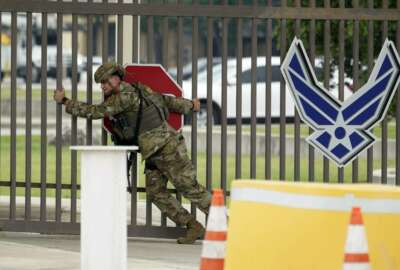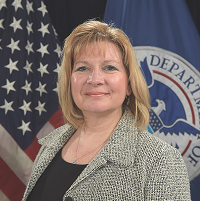Agencies looking for industry ideas on tracking vaccinations among their employees
In today's Federal Newscast, federal agencies are looking for private sector ideas on collecting vaccine information for their employees.
To listen to the Federal Newscast on your phone or mobile device, subscribe in PodcastOne or Apple Podcasts. The best listening experience on desktop can be found using Chrome, Firefox or Safari.
- The House overwhelmingly passed a bipartisan bill to establish a rotational cyber workforce program. The Federal Rotational Cyber Workforce Program Act would allow employees with cyber expertise to serve at multiple agencies on a rotational basis. The bill was first proposed in the Senate in 2019 and was reintroduced in the House by Reps. Ro Khana (D-Calif.) and Nancy Mace (R-S.C.). The bill requires the Office of Personnel Management to issue an operational plan for the program, and the Government Accountability Office to assess its effectiveness.
- The Cybersecurity and Infrastructure Security Agency is still focused on fighting misinformation. CISA Director Jen Easterly said her agency will maintain its “Rumor Control” website established during the 2020 election season to push back on false narratives spreading on social media. The project led to her predecessor Chris Krebs getting fired by former President Donald Trump. Easterly said fighting disinformation is as important as ever as CISA looks ahead to the 2022 elections. “I worry a lot about misinformation and disinformation as a citizen, but also as a mom,” she said at a recent event hosted by Amazon Web Services. “If you don’t have the facts, if you don’t have the best information, you can’t make the best decisions.”
- The Office of Personnel Management said prescription drug costs, chronic illnesses and the pandemic continue to have an impact on federal employee health premium rates. OPM said testing and treating COVID-19 patients cost the Federal Employees Health Benefits Program $1 billion in 2020. It anticipates those claims will go down as more people get vaccinated. FEHBP participants have from Nov. 8 through Dec. 13 to make changes to their health, dental and vision plans for 2022. Their premiums will go up an average of 3.8% next year. (Federal News Network)
- Federal agencies are looking for private sector ideas on collecting vaccine information for their employees. The Centers for Disease Control and Prevention said it’s interested in digital tools that can verify the vaccination status or most recent COVID-19 test results for its 25,000 employees. It issued a request for information to seek out ideas from industry. NASA is looking for a similar system. It’s interested in an IT solution that will allow NASA to quickly verify employee vaccination statuses, and display that status when they enter a federal facility.
- More than 93% of its active duty sailors have now gotten at least one dose of coronavirus vaccine according to the Navy. The numbers have risen following DoD’s mandate for servicemembers to get vaccinated against COVID-19. Active duty members have until Nov. 28 to get their shots; reservists will have another month. So far, the service hasn’t issued any waivers for religious reasons, but said it will consider them on a case-by-case basis.
- Military bases in the south are still facing travel restrictions because of COVID rates. About three quarters of military bases are in the green when it comes to travel restrictions. That means that commanders have deemed it safe for service members to take leave, move to different orders or allow more people on bases. Some bases in the south are still struggling to drop COVID rules, however. Bases in Florida, Georgia, South Carolina and other states where the delta variant is running rampant have had to keep their travel limits up or go back to previous health conditions. At the lowest COVID rates, the Defense Department was able to unburden about 90% of its installations.
- The Navy is looking for applicants for the next wave of its Naval Community College. The new online school plans to accept 5,500 students during the application period that starts tomorrow. The college will offer associates degrees in Military Studies, Cybersecurity, Nuclear Engineering, Data Analytics, Aviation Maintenance, Organizational Leadership and Logistics.
- The Space Force is holding classes on how to effectively leverage robotic automation for repetitive processes in the military. The service, along with the Air Force, held a workshop for service members on how to mix government and commercial technologies and experts to deliver results. The first-of-its kind class allowed students to create their own functional programs to perform simple tasks.
- Contracting officers at the Department of Veterans Affairs may be overworked and the agency has no consistent way to know for sure. After the Government Accountability Office added VA contracting officers’ workload as an area of concern in the 2019 High-Risk list, a new report by auditors said the agency still hasn’t solved the problem. VA’s inspector general said one solution could be to monitor contracting officer warrant usage to help agency leadership address the workload challenges by generating the data needed for more effective workload distribution. The IG found VA, for the most part, is following the federal policies and regulations in awarding contracting officer warrants to buy products and services.
- The Postal Service is moving ahead with slower delivery standards for first-class mail and small, lightweight packages. Allow an extra day or two for letters and some packages to arrive. USPS will implement its slower standard for first-class mail on Oct. 1, and will impact nearly 40% of first-class mail. USPS is also getting ready to implement slower standards for small, lightweight packages sent via its First Class Package Service. Both changes went through its regulator, the Postal Regulatory Commission, but the commission said slower service won’t make much improvement in the Postal Service’s long-term financial condition. (Federal News Network)
- A new council at the Department of Homeland Security will review the department’s law enforcement practices, including use-of-force policies and civil rights training. The Law Enforcement Coordination Council will include the leadership of every DHS law enforcement component, as well as advisory and oversight organizations, including the Office for Civil Rights and Civil Liberties (CRCL). Lawmakers have raised concerns about DHS law enforcement practices, including a recent incident where images of mounted Border Patrol officers confronting Haitian migrants went viral.
- The FAA’s shared service center is looking for some quick IT modernization wins. It’s Enterprise Service Center is preparing for a major modernization project of its financial management and procurement systems. The FAA ESC, which is one of four federal shared service providers for financial management, outlined 15 projects it plans to undertake over the next few years. These include updating the software that runs the systems, implementing a zero trust architecture and automating certain technology functions. The ESC released a request for information seeking industry feedback on its draft statement of work. Responses to the RFI are due Oct. 19.
- The Justice Department seeks feedback on what to include in an upcoming overhaul of the website for Freedom of Information Act requests. The DoJ’s Office of Information Policy is partnering with the General Services Administration’s 18F team to update FOIA.gov. The team is looking at features that include checking the status of FOIA requests online. As part of the overhaul, 18F is asking to interview agency and public users of the website, and find out what they’d like to see change. Volunteers have until Oct. 15 to participate.
Copyright © 2025 Federal News Network. All rights reserved. This website is not intended for users located within the European Economic Area.
Eric White
Eric White is news anchor and Federal Drive producer at Federal News Network.
Follow @FEDERALNEWSCAST
Related Stories
Some military installations are reinstituting COVID-19 travel restrictions
Related Topics
18F
All News
Centers for Disease Control and Prevention
Congress
COVID-19 vaccine
Department of Homeland Security
Enterprise Service Center
Federal Aviation Administration
Federal Drive
federal law enforcement
Federal Newscast
Government Accountability Office
Hiring/Retention
Justice Department
Management
military bases
NASA
National & World Headlines
Naval Community College
Postal Regulatory Commission
Postal Service
Space Force
Tom Temin
Workforce






